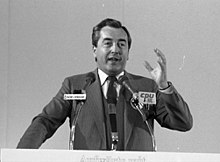Alois Mock
| Alois Mock | |
|---|---|

Alois Mock, speaking at a CDU party convention in 1983
|
|
| Vice-Chancellor of Austria | |
|
In office 21 January 1987 – 24 April 1989 |
|
| President | Kurt Waldheim |
| Chancellor | Franz Vranitzky |
| Preceded by | Norbert Steger |
| Succeeded by | Josef Riegler |
| Foreign Minister of Austria | |
|
In office 21 January 1987 – 4 May 1995 |
|
| Chancellor | Franz Vranitzky |
| Preceded by | Peter Jankowitsch |
| Succeeded by | Wolfgang Schüssel |
| Personal details | |
| Born |
10 June 1934 Euratsfeld, Lower Austria, Austria |
| Political party | Christian Social Party |
| Religion | Roman Catholic |
Alois Mock (born 10 June 1934) is a politician and member of the Austrian People's Party (ÖVP). He was Vice Chancellor of Austria from 1987 to 1989. As foreign minister he helped take Austria into the European Union.
Born in Euratsfeld, Lower Austria, to August and Mathilde Mock, he studied law at the University of Vienna and later international law in Bologna and Brussels. In Vienna, he became a member of K.A.V. Norica Wien, a Roman Catholic student fraternity, which is a member of the Cartellverband. From 1961-66, he advised the Bundeskanzler Josef Klaus on European Economic Community and EFTA policy and for the OECD in Paris. In 1966 he became Klaus' cabinet secretary. From 1969-70 was the youngest education minister in Austrian history.
After the Nationalrat elections of 1971 - where the Social Democratic Party of Austria (SPÖ) under Bruno Kreisky won a majority — he became a member of parliament and mayor of Euratsfeld. From 1971-78, he chaired the ÖAAB, the most important grouping of the ÖVP. From 1978-87 he was chairman of the parliamentary party and from 1979 was also federal party chairman. He was later to be succeeded by Josef Riegler, Erhard Busek and Wolfgang Schüssel. In 1979, Mock became the President of the European Democrat Union (EDU), and from 1983 to 1987 also of the international Christian democratic International Democratic Union (IDU). At the 1983 elections the ÖVP got almost the same percentage as Kreisky's SPÖ, who did not want to continue without an absolute majority and therefore retired.
...
Wikipedia
